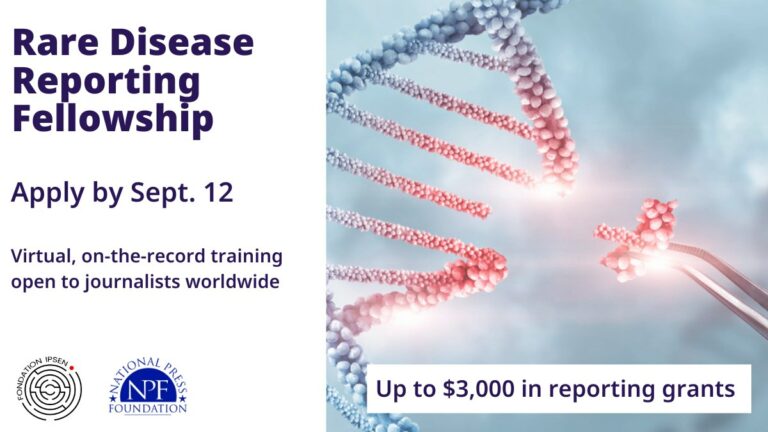Deadline: September 12, 2023
Applications are open for the National Press Foundation Rare Disease Reporting Fellowship 2023. The National Press Foundation is offering an online conference for journalists who wish to cover rare diseases from November 13-17, 2023.
The program will provide online briefings and question-and-answer sessions with top experts in rare diseases, diagnostics, targeted testing and drug development, as well as from leaders of patient advocacy groups and journalists who have covered these issues extensively.
Background
Rare disease is actually not particularly rare among humans – an estimated 8% to 10% of the global population has one. And though the number of people diagnosed with a particular rare disease in each country is often small, taken together, the number of rare disease patients and those who love and care of them may easily number half a billion people – and the advances being made in diagnosis and treatment may benefit far more.
For the more than 300 million people worldwide who live with a rare disease, the explosive growth of gene therapies and biotech advances has offered glimmers of hope. Families who struggle to identify these ailments, find appropriate care and tap into advocacy resources take encouragement from these advances, which could benefit patients—three-quarters of whom are children.
But there’s still one major challenge that cannot be ignored. Life with a rare disease in many Western countries is difficult, but what about regions of the world where research and medical resources are scarce? How can science finally make progress in ensuring that clinical trials for proposed treatments include people from diverse ethnic backgrounds?
The key issue is equity – in access to research, treatment and advocacy. There is an urgent need to communicate knowledge and expertise in the field of rare disease detection, and journalists can help deliver that knowledge to communities around the world.
Benefits
- NPF will give in reporting grants for participating journalists to cover travel expenses and time in executing a rare diseases project of their choosing.
Eligibility
- Open to journalists anywhere in the world.
- Employed journalists will need a letter of support from their editor, which includes a commitment to allow time off equivalent to the fellowship hours. For example, programming will run for roughly four hours per day November 13-17 to accommodate waking hours in most time zones; journalists should be given four hours off of work on those days. This is to ensure full participation.
- Freelance journalists should submit a letter from a news outlet interested in publishing their work.
- Journalists may work in any medium (print, radio, TV, online) and any language. Manuscripts or links to published work must be submitted in English, French, Spanish, German, Chinese or Portuguese by Feb. 29, 2024 (translation for works in languages other than English and French will be provided). Broadcast journalists may submit a summary and a link or recording of their story.
Application
You cannot save an incomplete application and return to it later, so have everything you need before starting the form. They cannot consider late or incomplete applications.
For more information, visit Rare Disease Reporting Fellowship.

